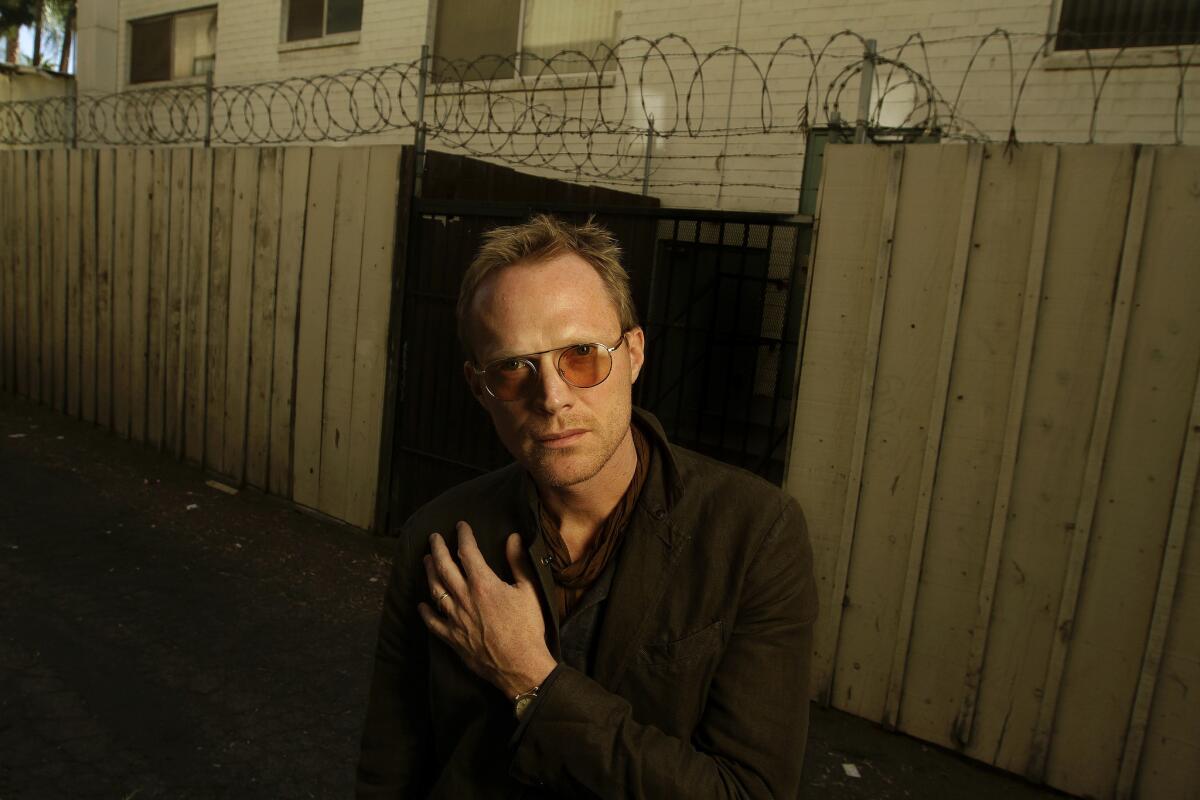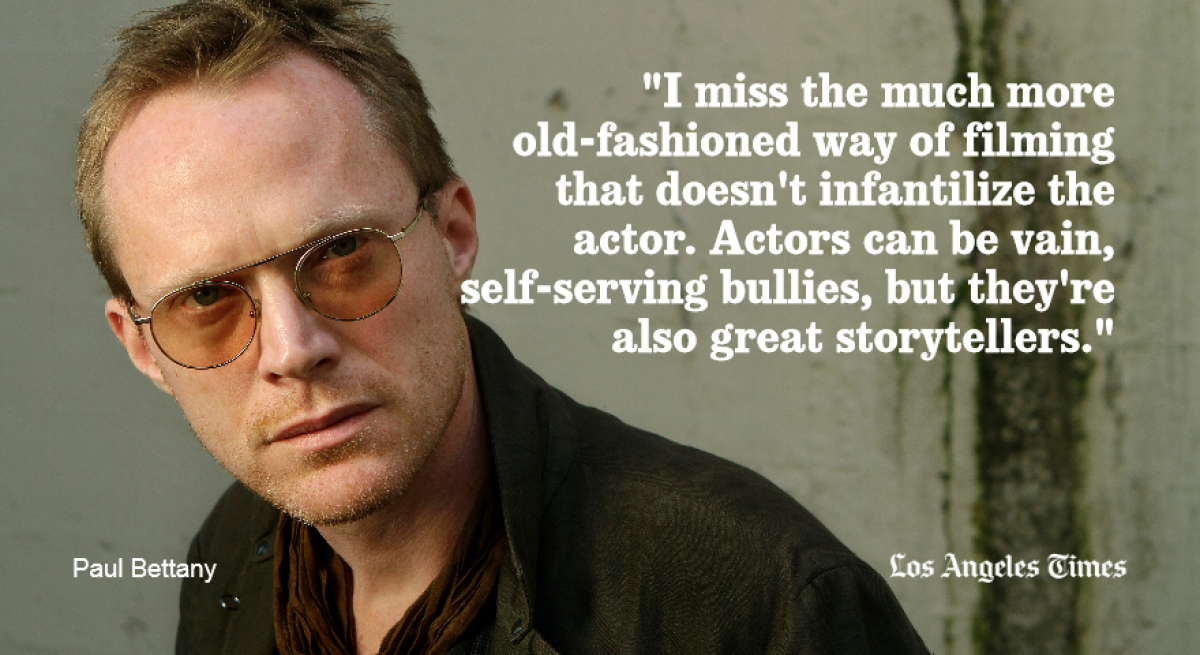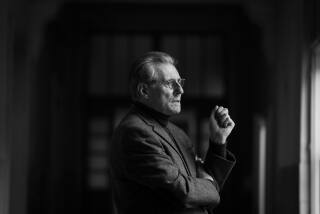Actor Paul Bettany takes on bleakness of homelessness in his directorial debut, ‘Shelter’

Actor-director Paul Bettany in Hollywood.
The homeless couple who lived on the street outside Paul Bettany’s $6.9-million Tribeca penthouse slept under a transparent plastic sheet. The actor passed the pair every weekday while walking his kids to school, and everyone shared awkward hellos. Sometimes he’d give them money.
But after a while the conversations waned.
“I’m ashamed to say that as time moved on, I stopped talking to them,” Bettany admitted.
And then Hurricane Sandy happened in 2012, and he and his wife, actress Jennifer Connelly, and their three children evacuated the city. When the storm passed, he returned to find the homeless couple had vanished. He couldn’t stop thinking about them. Had they been lucky? Or unlucky? Could he have prevented their disappearance?
SIGN UP for the free Indie Focus movies newsletter >>
So the British actor started writing his first screenplay, “Shelter,” about a widowed junkie and a Nigerian immigrant who fall in love and subsequently start bettering their lives. The film, which small indie distributor Screen Media Films opened over the weekend in a handful of theaters and on video-on-demand, also marks Bettany’s directorial debut.
At 44, he’s been acting for nearly two decades in films like “A Beautiful Mind,” “Master and Commander” and “Wimbledon” —- though most recently he’s gained attention as the super-powered flying android Vision in “The Avengers” and “Captain America” franchises.
But he’s always been intrigued by filmmaking. As a young actor, he said, he would ask crew members questions constantly: “What are you doing with the focus? Why is it that when we have less light you have less of a margin for error?”
Still, he wasn’t sure his years of observation qualified him to make a film. Eventually, Ron Howard — who has directed Bettany twice and knew the actor was itching to get behind the camera — asked what he was waiting for.
“I’m waiting for that secret to be passed onto me,” Bettany told Howard. “And Ron said, ‘What are you talking about? There’s no secret. If there is, it’s that there is none. You’ve just got to get on with it and make mistakes and go do it.’”
He wrangled $1 million in financing, cast his wife opposite fellow “Avenger” Anthony Mackie in a lead role and shot the movie in 21 days. Initially, he was reluctant to put Connelly in the film, but her name helped raise financing and “if you happen to have an Oscar winner lying around the house,” he said, “you’d do well to use her.”
He was sitting at the Nickel Diner, one of those popular hole-in-the-walls in downtown L.A. surrounded by both pressed juiceries and homeless encampments. He had these new glasses on that he’s started wearing lately —- their lenses are tinted orange, and they look like the kind of thing Bono would wear.
“Oh, they just go dark when I’m outside,” he explained, taking the two eggs over easy he’d ordered and plopping them onto a mountain of fries. “I’m so blind, I can’t read anything. It’s very annoying for me as I hurtle toward old age.”
“Shelter” first debuted at the Toronto International Film Festival in 2014, and Bettany knows that because it’s taken a while for the film to hit theaters moviegoers might assume it’s bad. He’s insistent that he asked for the release delay, intentionally waiting to open the movie around Thanksgiving, when the homeless are top of mind.
Still, critics haven’t been altogether kind to Bettany’s film, a bleak look at a couple trying to survive blizzards and unrelenting illness while sleeping on the cold concrete of alleyways. “The story on screen comes off as a naive interpretation of the homeless experience as imagined from a place of great privilege,” argued The Times’ review. Equally harsh criticism came from the New York Times, which said “Mr. Bettany’s sketchy, unconvincing screenplay is more interested in ... exploitative stunts than in seriously examining the social crisis it purports to lament.”
But Bettany said he was committed to conveying a realistic homeless experience. As a twentysomething in London, he worked as a street busker and counted many homeless individuals among his friends, he said. And when he began researching “Shelter,” he worked with the Coalition for Homeless, delivering meals and spending time in shelters.

Paul Bettany
“It’s a maneuver of the imagination that people really believe that they’re not going to find themselves in a similar circumstance,” Bettany said. “Which is why that response to homelessness is outright aggression — ‘You must have done something to bring yourself here.’ When I was a boy out with my father and we’d pass a homeless man, he’d say, ‘There but for the grace of God go I.’ And I don’t know what happened to that sentiment.”
While “Shelter” has its detractors, Bettany has a fan in Howard, who said he was “knocked out” by the film.
“I thought ‘Shelter’ was bold, powerful, and effective,” the director said by telephone. “Plus, any time a husband and wife work together in a high-pressure situation, you have to hope that the relationship is going to come out intact from a situation where the stakes are so high and destabilizing. It’s a real testament to their relationship that they made it through so well.”
Bettany would like to direct again, he said, though he has no plans to retire from acting. He’s already shot three films since wrapping “Shelter,” including the third installment of the “Captain America” series, which reunited him with Mackie. On the set of the Marvel film, Mackie was struck by how different Bettany came across as an actor.
“A lot of actors can’t go back to acting after they direct,” Mackie said. “They’ve directed a commercial and suddenly they’re like, ‘I don’t think that choice makes sense for me.’ But Paul never questioned anybody.”
Part of what drove Bettany to make “Shelter,” after all, was his desire for a more collaborative experience on set. He’d grown tired of showing up, being told where to stand and reciting lines like a good soldier.
“I go, ‘What do you need me for? What is it that I’m supplying?’” he asked. “‘Is my job just to make the dialogue sound real and imply some sort of vague emotion?’ I miss the much more old-fashioned way of filming that doesn’t infantilize the actor. Actors can be vain, self-serving bullies, but they’re also great storytellers.”
More to Read
Only good movies
Get the Indie Focus newsletter, Mark Olsen's weekly guide to the world of cinema.
You may occasionally receive promotional content from the Los Angeles Times.











